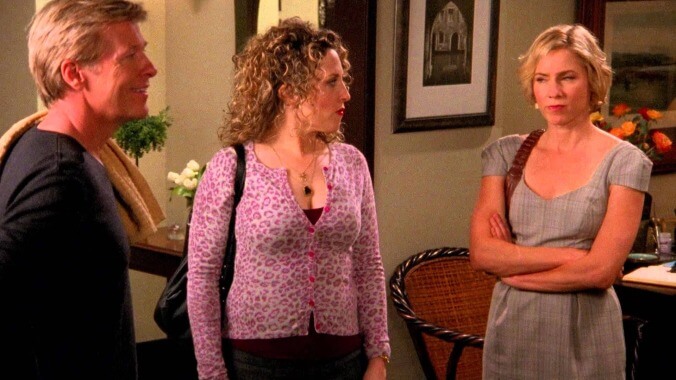Tony Shalhoub on The Marvelous Mrs. Maisel and the fabled Psych/Monk crossover

Tony Shalhoub plays buttoned-up exceptionally well—his repressed, depressed Adrian Monk is the most memorable character to emerge from a network devoted to them. But the Emmy-winning actor also spent much of Monk’s eight seasons hinting at the vibrancy buried beneath all the mannerisms and immaculate (if a bit drab) suits. His turn as Abe Weissman on Amy Sherman-Palladino’s The Marvelous Mrs. Maisel has allowed him to tap into that playfulness, though it’d be overselling things to suggest that’s where Midge (Rachel Brosnahan) gets her sense of humor.
But Midge’s new stand-up career has definitely affected the lives of her parents, Abe and Rose (Marin Hinkle), who are moving past wringing their hands over her failed marriage. Season two of the Amazon dramedy will further explore these effects, along with the next phase in the Weissmans’ marriage. The A.V. Club spoke with the actor at this summer’s Television Critics Association press tour, where he (vaguely) teased what’s ahead for Abe, if he’d ever don Monk’s iconic suit again, and whether he’s got a hankering for some pineapple.
The A.V. Club: You obviously can’t talk specifics, but what’s the mood ahead of the season-two premiere, coming off the Emmy nominations?
Tony Shalhoub: [Laughs.] Yeah, they’ve kind of sworn us to secrecy about the actual plotlines of season two, but what’s thrilling for me is that we had such an out-of-the-box successful, first-year run of episodes. I just felt like the bar was set so high. How are they ever going to able to match it? And much to our delight and surprise, the second season is just unbelievable. The scripts are, I feel, even stronger, and that’s saying a lot. And the relationships are really starting to become more complex. And so it’s really, really starting to… They’re really taking it to the next level.
AVC: Earlier you said you’re happy to watch Abe grow. What kind of growth are we talking about?
TS: Well, just in the sense that prior to when our story starts, prior to the pilot, Abe is established as a successful math teacher. We find out in season one that he’s being recruited by Bell Labs, but his life is fairly set. His marriage is there. His daughter and son are married. Their lives are set up and conventional until he hears this news that Midge’s marriage is falling apart, and all of a sudden there’s this upheaval, and the ripple effect of her issues and her problem are… well, they’re not ripples, they’re really large waves and going out in all directions. All of a sudden our established lives are kind of thrown into chaos, so there’s an adjustment.
But in season two, we’re also moving out of the late ’50s into the ’60s, so the country and the culture at large is going through a sort of seismic shift, especially for women, but also politically. And so that just makes for a very rich and fertile area for these characters to develop and grow and most importantly, change.
AVC: The show really takes care to show that Abe and Rose aren’t just the disapproving or concerned parents—they’re fully fleshed out in their own way, and it sounds like season two is going to go further.








































